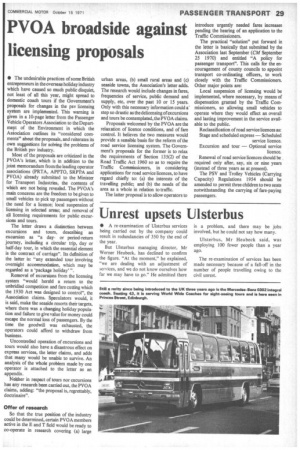PVOA broadside against licensing proposals
Page 31

If you've noticed an error in this article please click here to report it so we can fix it.
• The undesirable practices of some British entrepreneurs in the overseas holiday industry which have caused so much public disquiet, not least of all this year, might spread to domestic coach tours if the Government's proposals for changes in the psv licensing system are implemented. This warning is given in a 10-page letter from the Passenger Vehicle Operators Association to the Department of the Environment in which the Association outlines its "considered comments" about the proposals, and reiterates its own suggestions for solving the problems of the British psv industry.
Most of the proposals are criticized in the PV0A's letter, which is in addition to the joint memorandum from the leading operator associations (PRTA, APPTO, SRPTA and PVOA) already submitted to the Minister for Transport Industries, the contents of which are not being revealed. The PV0A's main concerns are the freedom to be given to small vehicles to pick up passengers without the need for a licence; local suspension of licensing in selected areas; and removal of all licensing requirements for public excursions and tours.
The letter draws a distinction between excursions and tours, describing an excursion as "a dayor period-return journey, including a circular trip, day or half-day tour, in which the essential element is the contract of carriage". Its definition of the latter is: "any extended tour involving overnight accommodation, which may be regarded as a 'package holiday' ".
Removal of excursions from the licensing system "would herald a return to the unbridled competition and fare cutting which the 1930 Act was designed to control", the Association claims. Speculators would, it is said, make the seaside resorts their targets, where there was a changing holiday population and failure to give value for money could escape the normal loss of passengers. By the time the goodwill was exhausted, the operators could afford to withdraw from business.
Uncontrolled operation of excursions and tours would also have a disastrous effect on express services, the letter claims, and adds that many would be unable to survive. An analysis of the whole problem made by one operator is attached to the letter as an appendix.
Neither in respect of tours nor excursions has any research been carried out, the PVOA claims, adding: "the proposal is, regrettably, doctrinaire".
Offer of research So that the true position of the industry could be determined, certain PVOA members active in the E and T field would be ready to co-operate in research covering (a) large
urban areas, (b) small rural areas and (c) seaside towns, the Association's letter adds. The research would include changes in fares, frequencies of service, public demand and supply, etc, over the past 10 or 15 years. Only with this necessary information could a' step so drastic as the delicensing of excursions and tours be contemplated, the PV OA claims.
Proposals welcomed by the PVOA are the relaxation of licence conditions, and of fare control. It believes the two measures would provide a sensible basis for the reform of the road service licensing system. The Government's proposals for the former is to relax the requirements of Section 135(2) of the Road Traffic Act 1960 so as to require the Traffic Commissioners, in considering applications for road service licences, to have regard chiefly to: (a) the interests of the travelling public; and (b) the needs of the area as a whole in relation to traffic.
The latter proposal is to allow operators to introduce urgently needed fares increases pending the hearing of an application to the Traffic Commissioners.
The practical "solution" put forward in the letter is basically that submitted by the Association last September (CM September 25 1970) and entitled "A policy for passenger transport". This calls for the encouragement of county councils to appoint transport co-ordinating officers, to work closely with the Traffic Commissioners. Other major points are: Local suspension of licensing would be implemented, where necessary, by means of dispensation granted by the Traffic Commissioners, so allowing small vehicles to operate where they would effect an overall and lasting improvement in the service available to the public.
Reclassification of road service licences as: Stage and scheduled express — Scheduled service licence. Excursion and tour — Optional service licence. Renewal of road service licences should be required only after, say, six or nine years (instead of three years as at present).
The PSV and Trolley Vehicles (Carrying Capacity) Regulations 1954 should be amended to permit three children to two seats notwithstanding the carrying of fare-paying passengers.
















































































































